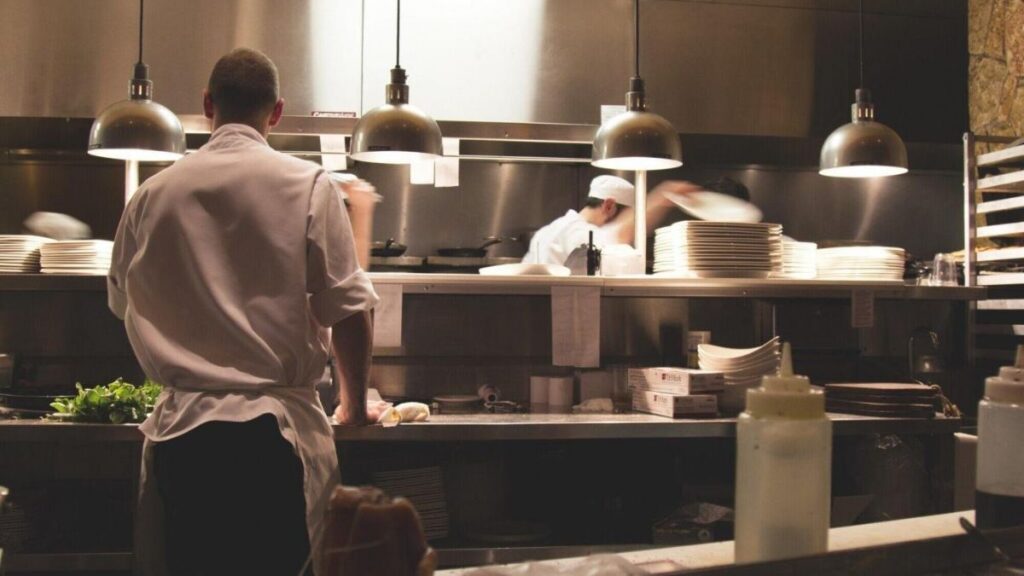Do you know how grease and dust might be affecting your kitchen’s safety and performance?
In a busy restaurant, these hidden problems can harm both your team and the quality of your food. By controlling grease and dust, you can create a cleaner and safer kitchen.
This article presents easy ways to keep your kitchen in top shape.
Control Grease Buildup
Grease buildup is common in kitchens due to cooking processes, especially frying. Over time, it can cause slippery surfaces, attract pests, and even lead to fires. Here’s how to manage it:
Use Grease Traps
Grease traps capture grease before it enters your plumbing system. They are typically installed in sinks or drainage systems. A grease trap prevents grease from causing clogs or damage to your pipes and plumbing.
Regularly cleaning the trap is necessary to keep it working properly. Make sure to follow local guidelines for cleaning and emptying it.
Install and Maintain Grease Filters
Grease filters are installed in the kitchen’s ventilation system to capture airborne grease particles. They are placed in exhaust hoods or ducts above cooking equipment. This prevents grease from spreading onto surfaces in the kitchen.
Filters must be cleaned regularly to maintain airflow and effectiveness. Replace filters when they are worn or excessively dirty.
Regularly Clean Cooking Equipment
Cleaning cooking equipment is key to controlling grease buildup. After each use, it is important to wipe down surfaces such as grills, fryers, and stovetops. Allowing grease to build up will make cleaning more difficult later.
Use degreasers and scrubbing pads to remove grease and oil. This should be done daily to prevent significant accumulation.
Use Degreasers
Degreasers are cleaning products designed to break down grease and oils. They are often applied to cooking equipment, countertops, and floors. Using a degreaser makes it easier to remove grease and prevent buildup.
Make sure to use safe, food-grade degreasers. Follow manufacturer instructions for best results.
Manage Dust in the Kitchen
Dust can lead to food contamination, health issues, and create unnecessary fire hazards. Here’s how to effectively manage dust in your kitchen:
Regular Surface Cleaning
Dust can settle on surfaces like counters, shelves, and cooking equipment. To control dust, clean these surfaces regularly using a damp cloth. This prevents dust from spreading and reduces the chance of contamination.
It is best to wipe surfaces down at the beginning and end of each shift. Consistent cleaning will keep the kitchen free from dust and dirt buildup.
Floor Cleaning
Floors are a primary area for dust accumulation. To keep floors clean, mop them frequently using a damp mop instead of sweeping. Sweeping can stir dust into the air and spread it around.
Regular mopping traps dust and prevents its spread. Pay special attention to corners and edges where dust often collects.
Ventilation Is Key
Ventilation is essential in a restaurant kitchen for hygiene and safety. Poor ventilation can lead to unsafe working conditions, increased grease buildup, and a generally uncomfortable environment for staff. Here’s how to optimize ventilation in your kitchen:
Install Exhaust Hoods
Exhaust hoods are vital for removing smoke, grease, and steam from cooking areas. These hoods are placed directly above cooking equipment like stoves, grills, and fryers. They pull air through filters and send it out of the kitchen, preventing grease buildup on surfaces.
Exhaust hoods must be cleaned regularly to remain effective. When filters are clogged with grease, the system won’t work properly.
Use a High-Quality Ventilation System
A high-quality ventilation system is necessary to keep the kitchen air fresh and regulate temperature. This system includes exhaust fans that pull air from the kitchen and replacement systems to bring fresh air back inside.
Regular maintenance will help ensure that these systems are running efficiently. Routine checks prevent breakdowns and maintain airflow.
Maintain Airflow with Proper Ductwork
Proper ductwork ensures that the air moves smoothly from the kitchen to the outside. Ducts should be as straight as possible, with minimal turns to allow for easy air flow.
Cleaning ducts regularly helps prevent grease and dust buildup, ensuring full system capacity. It also keeps the system working at its best.
Install Return Air Vents
Return air vents are used to keep the air in the kitchen balanced. They help pull air back into the system to prevent the space from becoming pressurized or stuffy.
These vents allow air to circulate freely. This makes the kitchen feel more comfortable for staff.
Regularly Replace Filters
Filters capture grease, dust, and other particles in the air. These filters must be replaced or cleaned on a regular schedule to keep the system working efficiently.
Dirty filters reduce airflow, so routine replacement is necessary. This keeps the air clean and the system functioning properly.
Train Staff
Proper staff training is essential for maintaining a clean and safe kitchen. Staff should be taught how to use kitchen equipment, clean surfaces, and manage the ventilation system. They should also know the risks of grease buildup and dust in the kitchen.
Training equips staff to understand their role in kitchen safety. It also helps them to identify and report issues before they become bigger problems.
Routine Inspections
Routine inspections are necessary to ensure that kitchen equipment and ventilation systems are working properly. Inspections help identify any areas where grease, dust, or dirt have built up. Checking these areas regularly can prevent safety hazards like fires and health risks.
If you need assistance with more thorough cleaning, consider this professional commercial kitchen cleaning company in Nashville. Regular inspections also help identify equipment that needs maintenance or replacement. Keeping track of inspections ensures that everything is functioning as it should.
Keep Your Kitchen Clean and Your Kitchen Clean Keeps You Safe
Managing grease and dust is important for keeping a restaurant running smoothly. A clean kitchen reduces risks, improves air quality, and keeps everyone safer.
Regular cleaning and equipment care, along with staff training, help maintain a healthy kitchen. By making these tasks part of your routine, you create a better working environment. A safe and clean kitchen is a smart investment for your business.
We hope you enjoyed reading this article. If you found it helpful, be sure to check out our blog for more informative resources.







